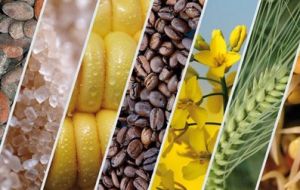MercoPress. South Atlantic News Agency
Global food prices in July 33% higher than a year ago, says World Bank
 Maize was up 84%, sugar, 62%, wheat, 55% and soybean oil, 47%
Maize was up 84%, sugar, 62%, wheat, 55% and soybean oil, 47% Global food prices are at high levels and when combined with continued volatility, put the poorest people in the developing world at continued risk, according to the World Bank Group’s Food Prices Watch released Monday.
While the emergency in the Horn of Africa was triggered by prolonged droughts, especially in areas struggling with conflict and internal displacement such as Somalia, food prices that are near the record high levels seen in 2008 also contributed to the situation, the report said.
“Nowhere are high food prices, poverty and instability combining to produce tragic suffering more than in the Horn of Africa,” said World Bank President Robert B. Zoellick. “The World Bank is stepping up with short term help through safety nets to the poor and the vulnerable in places like Kenya and Ethiopia, along with medium term support for economic recovery. Long term support is also critical to build drought resilience and implement climate-smart farming.”
The Food Price Watch says global food prices in July 2011 remain significantly higher than a year ago. Prices overall remained 33% higher than a year ago with commodities such as maize (up 84%), sugar (up 62%), wheat (up 55%) and soybean oil (up 47%) contributing to the increase. Crude oil prices are 45% higher from July 2010 levels, affecting production costs and the price of fertilizers, which increased by 67% over the same period.
Prices from April through July settled roughly 5% below the recent spike in February 2011 due to modest declines in grains, fats and oil, and other foods such as meat, fruits, and sugar. However, prices of some commodities remained volatile during this period. For example, maize and wheat prices declined in June and then increased in the first half of July. The price of rice fell from February to May, but has since increased.
“Persistently high food prices and low food stocks indicate that we’re still in the danger zone, with the most vulnerable people the least able to cope,” Zoellick said. “Vigilance is vital given the uncertainties and volatility that exists today. There is no cushion.”
The quarterly report warns that vigilance is needed as global food stocks remain low and expected volatility in the prices of sugar, rice, and petroleum products could have unexpected effects on food prices in the months ahead. Uncertainties about the global economy combined with the political situation in the Middle East and North Africa region will likely to keep oil prices volatile in the short term, it added.
Domestic food prices continued to be volatile across countries. Maize prices, for instance, were up more than 100% in Kampala, Mogadishu and Kigali markets in the 12 months to June; while prices for maize fell 19% in Port-au-Prince and Mexico City. In the midst of these large price variations, domestic prices of key staples increased sharply in a number of regions in the past quarter, notably in Central and South America and East Africa. The report also says sustained increases in food prices are driving up inflation in a number of countries such as Ethiopia and Guatemala among others.




Top Comments
Disclaimer & comment rules-

Read all commentsNowadays the cost of food is one of the many economic indicators that things are becoming more expensive.Prices tend to go up and they just keep getting higher and higher without having a chance to go down and let us consumers recover for the high prices. Saving money on groceries, with some helpful hints, is an excellent way to beat the higher cost of food.So here are some helpful tips for you. Check this source : Tips for saving money on groceries when food prices rise
Aug 23rd, 2011 - 04:43 am 0Commenting for this story is now closed.
If you have a Facebook account, become a fan and comment on our Facebook Page!